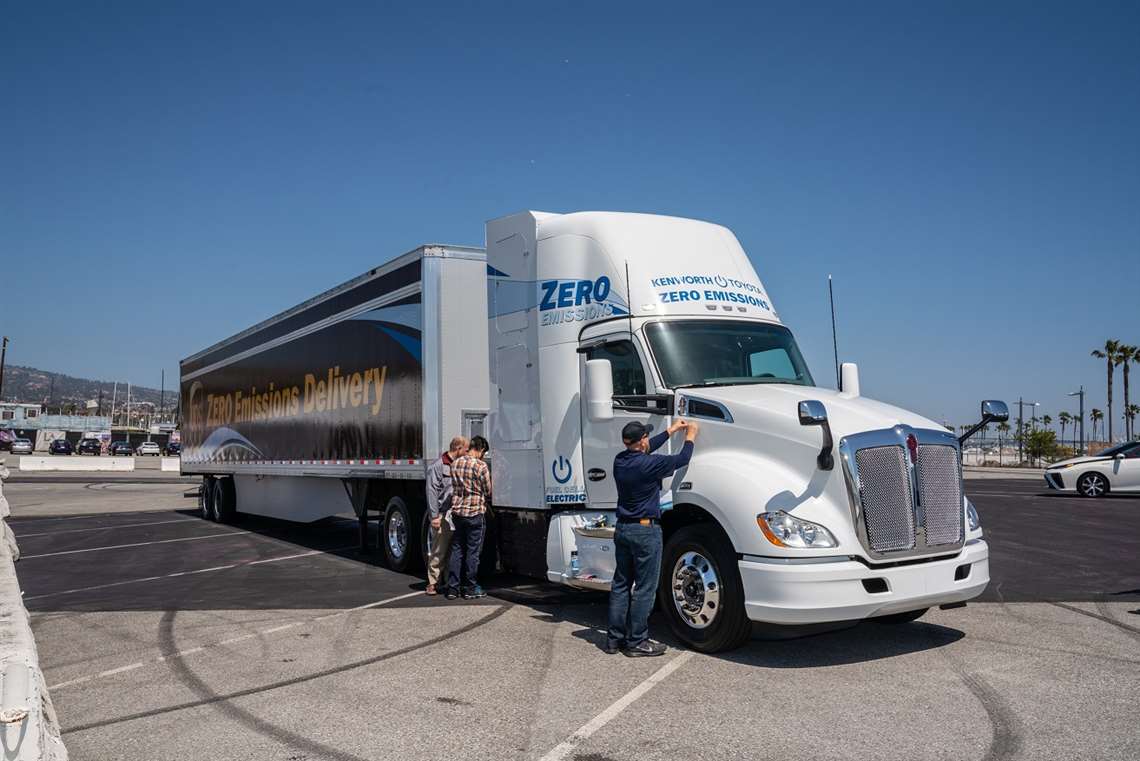California Mandates Electric Trucks
29 June 2020

- Short-haul drayage fleet in ports and railyards by 2035, and zero-emission “last-mile” delivery trucks by 2040
- Other states considering similar regs
- Funding questions pushed into the future
- New limit on NOx being considered
As it did with diesel emissions in the 1990s that eventually led to the Clean Air Act regulating diesel engines nationally and creating the regulatory Tiers the industry lives with today, California is once again driving the technology of vehicle emissions.
On June 25th, the California Air Resources Board (CARB) the California Air Resources Board adopted a rule requiring truck manufacturers to transition from diesel trucks and vans to electric trucks beginning in 2024. By 2045, it is expected every new truck, in some uses, sold in California will be electric.
The rule the puts California on the path for all zero-emission short-haul drayage fleet in ports and railyards by 2035, and zero-emission “last-mile” delivery trucks and vans by 2040. However, even as it approved the mandate, the board pushed infrastructure and incentive funding questions into the future.
Specifically, the ruling requires manufacturers who certify Class 2b to 8 chassis or complete vehicles with combustion engines would be required to sell zero-emission trucks as an increasing percentage of their annual California sales from 2024 to 2035. By 2035, zero-emission truck/chassis sales would need to be 55% of Class 2b – 3 truck sales, 75% of Class 4 – 8 straight truck sales, and 40% of truck tractor sales.
For the latest in electrification & electric vehicles go to NewPowerProgress.com
As was the case with CARB’s diesel emissions rulings in the 1990s, where California goes in things like this, other states, or the U.S. as a whole often follows. CARB, in this case has established a template that other states, if they so choose, can adopt for themselves. And indeed, some press reports following the rule announcement said at least seven states and the District of Columbia are looking at adopting similar legislation.
More information on the scope of the ruling can be found here.
In its announcement, CARB said, “This requirement to shift to zero-emission trucks, along with the ongoing shift to electric cars, will help California meet its climate goals and federal air quality standards, especially in the Los Angeles region and the San Joaquin Valley – areas that suffer the highest levels of air pollution in the nation. Statewide, the Advanced Clean Truck regulation will lower related premature deaths by 1000.”
Further, CARB said, “the rule drives technology and investment, phasing in available heavy-duty zero-emission technology starting in 2024 with full transformation over the next two decades. This sends a clear signal to manufacturers, fleet owners and utilities that the time to invest in zero-emission trucks – and the economy – is now. It builds on California’s leadership as a manufacturer of zero-emission transportation.”
Industry Reaction
As expected, industry groups questioned, if not the intent of the ruling, at least the timing. The LA Times quoted Jed Mandel, president of the Truck and Engine Manufacturers Assn. as saying, “the mandate is flawed. There is no charging infrastructure, there is inadequate incentive funding available for buyers and zero-emission trucks cost more than traditional fuel trucks,” he said.
Mandel suggested the program be delayed for two years, the Times reported, until 2026, to allow more time for truck-specific charging systems to be installed and for the consideration of policies to encourage the purchase of such vehicles, state incentives for buyers, and a mandate on fleet operators to buy a set percentage of zero-emission trucks.
For more on the Truck and Engine Manufacturers Assn. click here.
The Diesel Technology Forum (DTF) reacted to the ruling saying, ““beginning in 2011, all new heavy-duty trucks have been equipped with selective catalytic reduction and particulate control technologies. These combine to achieve stringent new U.S. Environmental Protection Agency and CARB emissions requirements for NOx emissions of no more than 0.20 grams per brake horsepower hour (g/bhp-hr). This is in addition to PM emissions levels of no more than 0.01 g/bhp-hr.
“In California, the DTF said, “only 36 percent of registered diesel trucks in operation are of this newest generation, placing the golden state 40th out of 50 for the penetration of new technology diesel engines on the road, falling short of the national average of 43 percent, and well behind Indiana where over 65 percent of all registered trucks are of the newest generation.
“A combination of factors contributes to the lower penetration of new technology diesel engines, including economic conditions but also the regulatory environment where California’s truck and bus fleet rule has disrupted the marketplace, effectively delaying regular fleet turnover rates, keeping older, higher emitting trucks on the road for longer, and in turn delaying emissions reductions and cleaner air.”
See the full Diesel Technology Forum statement here.
More Coming
And CARB isn’t finished. The Board is also considering two other regulations. The first sets a new limit on NOx (oxides of nitrogen), one of the major precursors of smog. This will require that new trucks that still use fossil fuels include the most effective exhaust control technology during the transition to electric trucks. There is also a proposed requirement for larger fleets in the state to transition to electric trucks year over year.
STAY CONNECTED




Receive the information you need when you need it through our world-leading magazines, newsletters and daily briefings.
POWER SOURCING GUIDE
The trusted reference and buyer’s guide for 83 years
The original “desktop search engine,” guiding nearly 10,000 users in more than 90 countries it is the primary reference for specifications and details on all the components that go into engine systems.
Visit Now
CONNECT WITH THE TEAM









